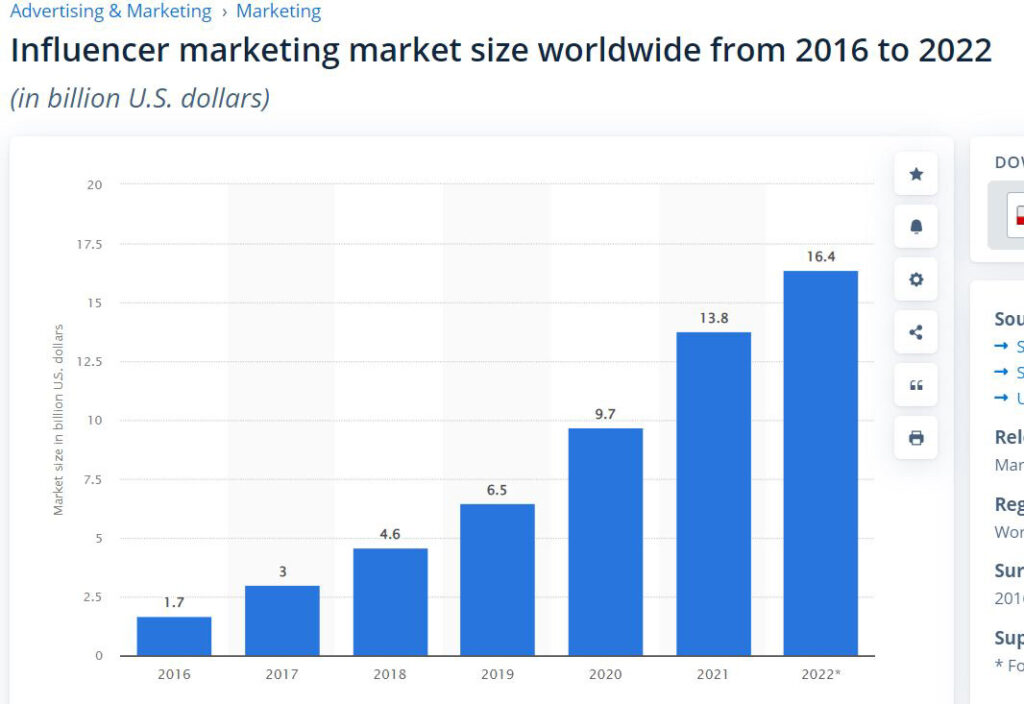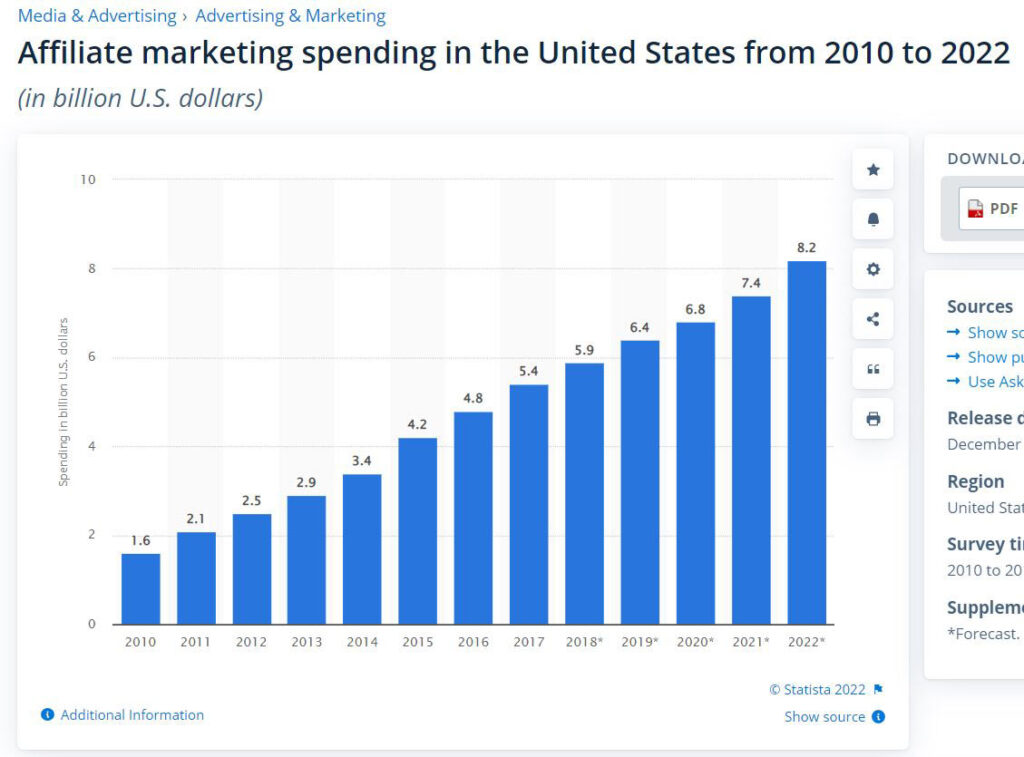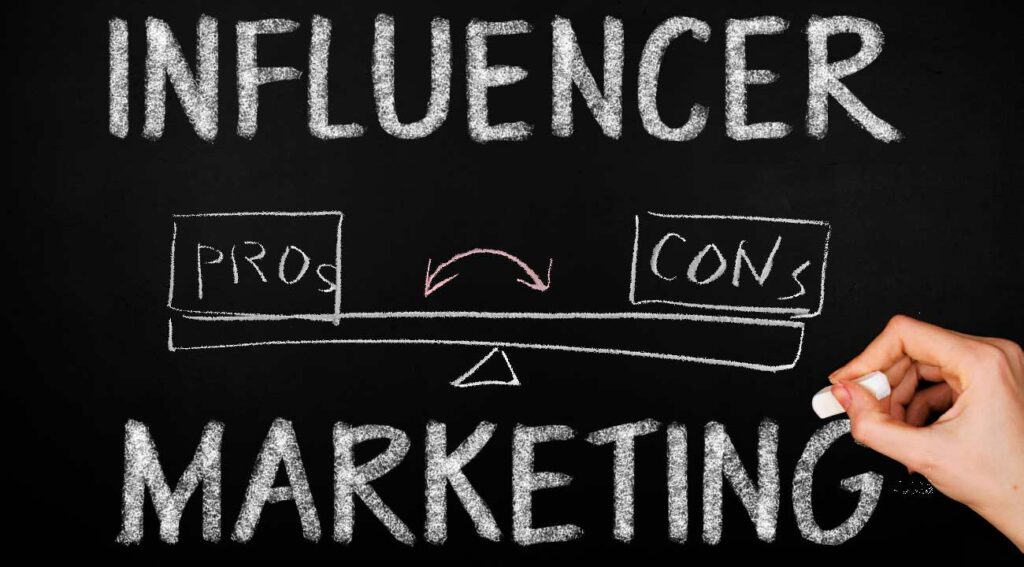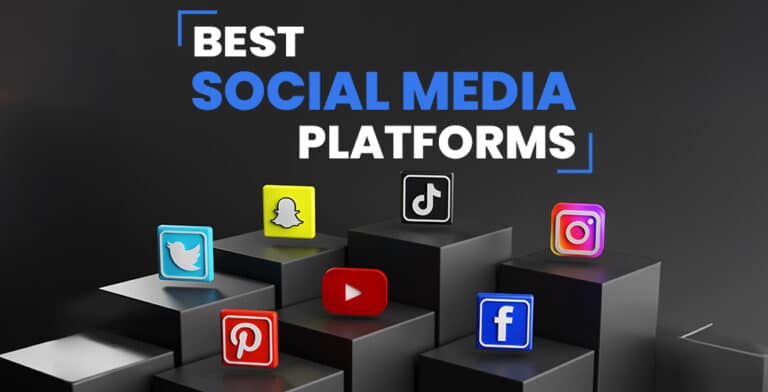As more and more businesses move towards digital platforms, the need to find the right marketing strategy is becoming essential. Currently, the two most prominent ways to promote a business online are to either go for influencer marketing or affiliate marketing. But which one is the right choice?
Businesses have been using affiliate marketing to promote their products and services online for a really long time now. But with how popular influencers have become within the last decade, more and more companies are transitioning to using influencer marketing for online marketing.
The reason behind this shift is that billions of people are logging into social media sites like Facebook, Instagram, Twitter, YouTube, etc., every day. And the best way to reach them is through influencers, as people trust their words the most on social media platforms.
But that does not mean affiliate marketing is not effective anymore. Brands and conglomerates have been using affiliates to promote their businesses through various blogs, web content, emails, newsletters, social media posts, etc. In other words, affiliate links can be placed almost anywhere online, which makes them very useful for generating traffic and gaining new customers.
Now, if you are wondering what exactly are these marketing terms or which one you should incorporate into your business, then take a moment to read the rest of this article as we will attempt to clear out all of your confusion and questions.
What Is Influencer Marketing?
If you are fairly active on social media, then you should have at least heard of the term “influencer.” Hence, influencer marketing is the process of partnering up with influential online personalities from social media platforms to promote your brand’s products and services.
This is a powerful method of reaching potential customers, especially if you collaborate with an influencer who covers the same niche as yours. Since the followers of an influencer generally trust what they say, they are likely to at least check out the influencer’s recommendation.
Perhaps you aren’t convinced yet about the impact influencers have on marketing. So, here are a few stats for you:
- The global influencer marketing industry size was reported to be $13.8 billion as of 2021 and is expected to reach $16.4 billion by the end of 2022. Moreover, the industry has been growing steadily ever since 2016, according to Statista.
- Over 75% of marketers plan to allocate dedicated budgets for influencer marketing in 2022. In addition, 68% of marketers who are already partnered with influencers have decided to increase their influencer marketing spending.
- Instagram was the preferred platform for 80% of brands that are engaged with influencer marketing.
- Social commerce is expected to account for 17% of all e-commerce spending by 2025.

However, if you are already planning to launch an influencer marketing campaign or are already involved with one, here are a few key metrics that can determine the success of your promotional efforts.
- No. of followers: Promoting your brand through influencers will bring in a certain amount of new followers. But what you need to check is if that number is higher, lower, or equal to the target you have set for yourself.
- Engagement: Engagement is simply the amount of attention you are generating from your audience. Check how many views, comments, likes, shares, link clicks, etc., you are getting now in comparison to before.
- Traffic and conversion: Keep an eye on your website traffic and see how many people have bought something from your store. If the number of customers has increased, then your campaign was a success.
- Lead generation: Lastly, if you have a signup form, check the number of new people who have completed it during the time frame of the campaign.
What Is Affiliate Marketing?
The main purpose of affiliate marketing is to promote your products and services on an external site. This can be in the form of blog posts, social media captions, reviews, emails, etc. The way it works is people see your link, click it, and then purchase something from your website. Here, the affiliate is the external website that is generating traffic for you. Moreover, a small percentage of each sale is given as a commission to the affiliate site.
If you are interested to know whether investing in affiliate marketing would be a good idea, here are a few important statistics that you should know about:
- It has been estimated that the total spending on affiliate marketing in the U.S. amounted to $7.4 billion. And this value is expected to reach $8.2 billion in 2022. Although the industry isn’t as valuable as influencer marketing, according to Statista, it has been growing year over year since 2010.
- 40% of U.S. firms claim that affiliate programs are their leading channel for customer acquisition.
- SEO is the number one source of web traffic for affiliate marketers (69.22%), followed by social media (67.32%), blogs (64.48%), email marketing (41.47%), and Pay-Per-Click (34.28%).
- 73% of merchants reported that they were able to meet their revenue targets using affiliate marketing programs.
- 16% of all online orders come from affiliate marketing links. This might not seem like a lot, but given the fact that millions of people shop online every day, 16% is a huge chunk!

To gauge how successfully you are running your affiliate marketing campaign, here are a few important metrics that you need to keep track of.
- Web Traffic: Just like influencer marketing, make sure to keep track of the number of people that are visiting and exploring your site.
- Sales Volume: The main purpose of an affiliate marketing campaign is to increase the overall sales of your products and services. So, make sure to check and compare your sales numbers before and after the campaign. If the number of sales increased, then the campaign was a success.
- Average Order Value: Another important sales metric that you should monitor is the average order value. Simply put, see if your leads are only buying the bare minimum or are buying multiple products at once.
The Pros And Cons Of Influencer Marketing
It’s easy to fall on the bandwagon of what everyone else is doing. And influencer marketing is just that! Since a large number of online-based businesses employ influencers for their promotional activities, does not mean that it will be just as effective for you. So, to help you decide, here are some of the advantages and disadvantages of influencer marketing that you should know about.

The Pros Of Influencer Marketing
- Helps You Reach Your Target Audience: The most important aspect of any influencer marketing campaign is to understand that your brand must collaborate with influencers who are working in the same field as you. That is why you must be careful about which influencer you onboard into your program. Since influencers have already built a community around a specific niche, brands can tap into those communities to reach their target customer base. This allows the brand to not only find potential new customers but also create retention among the existing customer base. For instance, if you own a restaurant, then working with popular food bloggers would yield the best results.
- Helps Build Credibility: Building trust and credibility amongst your target audience is a long and arduous process. However, influencers can speed this up as their audience has faith in them to provide authentic information and recommendations. So, in order to do that, you must not only partner with influencers who are working in your sector, but also ensure that they have the proper authority. In fact, there are several beauty brands that have found immense success by teaming up with Instagram influencers.
- Relatively Affordable: You may not know this but influencer marketing is a lot more affordable than traditional marketing methods like TV, radio, magazine, and newspaper ads. But that does not necessarily mean you can hire Cristiano Ronaldo for a few hundred dollars to promote your product. As disappointing as that is, a better idea would be to join up with nano or micro-influencers. That is because micro-influencers have much better engagement while also being relatively inexpensive to hire.
The Cons Of Influencer Marketing
- The Wrong Influencer Can Harm Your Reputation: In regards to the first pro, it cannot be stressed enough how important it is to find the right influencer for your brand. The wrong influencer could potentially sabotage a brand’s reputation. A prime example of this is when Pepsi partnered with Kendall Jenner for their global diversity campaign, which turned into a huge scandal. It led to Pepsi having to take down the ad and publicly apologize for it. A lot can be said about why this was such a bad idea, but one of the main reasons is that Kendall Jenner was not a suitable choice for the role.
- Difficult To Evaluate Metrics: Although there are several metrics that you can use to measure the success of an influencer marketing program, there are still quite a few things about it that are difficult to quantify. For instance, when Samsung or Apple sends over a review copy of their latest smartphone to a popular tech YouTuber, most of the time these early hands-on reviews generate a lot of hype, buzz, and engagement. Other times, your brand could be doing the exact same thing, but not have much success. In other words, there may be underlying reasons as to why your campaign doesn’t take off that are hard to pinpoint.
- Fail To Resonate With The Audience: Sometimes influencers just simply lack the ability to properly convey the brand’s message to the audience. It’s easy to talk about things that you are passionate about, but it can be quite difficult to promote a product that you don’t necessarily care for. This lack of interest or passion creates a form of disconnect between the influencer and their audience, which can cause people to think that the influencer has paid off.
The Pros And Cons Of Affiliate Marketing
Despite not being as popular as influencer marketing, affiliate marketing is usually the go-to strategy for most online businesses. That is because it is easy to pull off and track, which makes it quite convenient for brands that are just starting out. So, let’s see what are the most noteworthy advantages and glaring disadvantages of affiliate marketing.

The Pros Of Affiliate Marketing
- Easy To Get Into: Promoting your brand using affiliate marketing is fairly straightforward as there aren’t any barriers to entry. Furthermore, you also don’t need any specialized knowledge or expertise for it either. Some basic research can give you all the idea you need for it. But the best thing about it is that you have the scope to make mistakes and learn along the way. Nothing can affect your company in a negative way. Hence, it is quite easy to become successful using affiliate marketing if you use a trial-and-error method to determine what works and what doesn’t.
- Flexible And Convenient: With affiliate marketing, you can set up multiple affiliate programs across a wide range of websites. That way you can prioritize the programs that are performing the best and get rid of the ones that are not getting much traction. This approach allows you to maximize your income and profit margins. Also, tracking your program’s effectiveness is quite easy as you can just use Google Analytics.
- Scope For Passive Income: Not only is affiliate marketing easy to get into, but you also have the ability to generate passive income. After you are done setting up your affiliate links, you can sit back, relax, and watch the revenue come in. But do keep in mind that you have to learn the tricks of the trade before you can properly begin earning this income.
The Cons Of Affiliate Marketing
- Heavy Competition: Since it’s so easy to get into affiliate marketing, you can be sure that there are plenty of other businesses that are following suit. Hence, you can expect some fierce competition. So, you need to make sure your offering is interesting and unique enough for people to check it out, otherwise, you might get overshadowed by your competitors.
- No Guarantee Of Revenue: The aspect of affiliate marketing that usually drives people away is likely to be that there is no guarantee of revenue. One day your affiliate network could be performing perfectly and the next day you may not even get a single dime from it. You have to accept this risk if you want to take this route.
- Lack Of Customer Retention: In its truest form, affiliate marketing is nothing more than a glorified referral program. This means that in most cases, the leads that come to your website using referral links are likely not to return, especially if they do not find your offering appealing. As a matter of fact, a lot of people even try to avoid clicking on any affiliate links. Overall, it is not possible to create a solid customer base with affiliate marketing.
Overview Of The Differences Between Affiliate And Influencer Marketing
Here is a snapshot of the key differences between affiliate and influencer marketing:
| Influencer Marketing | Affiliate Marketing | |
| Purpose | Brand awareness and increased reach | Lead generation and increased income |
| Where to find them | Instagram, Facebook, YouTube, and other social media platforms | Sites and companies that operate in the same industry |
| Who are they | Social media influencers, celebrities, industry experts, etc. | Blogs, publishers, companies, etc. |
| Compensation | Compensated via either a flat fee, pay-per-post, free product, etc. | Typically compensated via a pay-per-action model |
| How to measure | Social media engagement, no. of new followers, site traffic | Sales volume, order value, site traffic |
What’s Best For Your Brand?
So, how do you choose which marketing method would be the best for your brand? Well, there are a few things you need to consider: your goal, audience, and budget.
Goal: If you want your to get the audience excited about your product, then go for influencer marketing. On the other hand, if you want to promote your product through various mediums like websites, blogs, etc. then affiliate marketing is your best bet.
Audience: If your target audience is millennials and Gen Z, then influencer marketing is the best option. However, if you are targetting a very specific set of people like tech enthusiasts, then placing affiliate links in the sites and platforms they visit the most would give you the best outcome.
Budget: Lastly, depending on the size of your budget and how you want to utilize it, will determine which option would be best for you. If you are willing to spend money upfront, then you can consider going for influencer marketing. But if your strategy is to pay after seeing the results, then there is no better option than affiliate marketing.
To wrap up, we have highlighted all the primary information you would need about these two styles of online marketing so that you can make an informed decision about which route you want to take. Both types of marketing have their own sets of pros and cons that you need to take into account, as well as all of their differences. But whichever route you do decide to take, if you implement it correctly, then you are more than likely to have a successful campaign.




